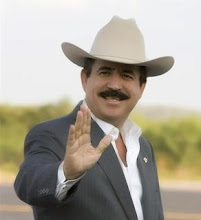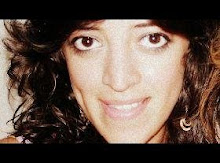
Following the removal by a military coup of José Manuel Zelaya on 28 June, the people of Honduras have been engaging in a peaceful struggle for his restoration as president, for their rights, and for the convening of a constituent national assembly. Much is said about a possible military intervention by the Venezuelan president, Hugo Chávez; of a supposed wish by President Zelaya to perpetuate himself in power; and of Zelaya's alleged crimes, but these are all being used simply to mask the real reasons for the coup. Since his election, my father has promoted the idea of "citizen power": the involvement of citizens in the decision-making process. He promoted the Citizen Participation Law, giving the people the right to use surveys, plebiscites and referendums to participate in decision-making. From the beginning, the media criticised his ideas, proposals and actions. Sometimes they called him mad. They accused him of ignorance. They branded his government ineffective. Later they called him populist, and now they say he is a communist and fugitive from justice. In government, my father fulfilled his campaign promises, starting with cuts in fuel prices. This caused direct confrontations with the major oil multinationals. He denounced the plundering of the state electricity and telecommunications enterprises, which had been forced into bankruptcy. He worked for their recovery and to avoid privatising the few remaining state firms in a country where some 80 per cent of our resources have been privatised. My father confronted the media. He condemned the media owners' contracts, exemptions from taxes, concessions worth millions, and illegal businesses such as firearms supply firms. He also achieved free education for all children, guaranteed school meals for more than 1.6 million children from poor families, reduced poverty by almost 10 per cent during two years of government, and provided direct state help for 200,000 families in extreme poverty, supplying free electricity to those members of society most in need.
His government raised the minimum wage by 80 per cent and, after 16 years of economic stagnation, achieved historically outstanding growth levels. Agriculture - in a country dependent on imports for 70 per cent of its grain - has been strengthened. The production of a wide range of grains has been developed. With ALBA (the Bolivarian Alternative for the Americas, a regional trade group led by Venezuela), the state bank has been capitalised. Domestic employees have been integrated into the social security system, a co-operation agreement has been signed with Petrocaribe (a regional energy trading organisation), and the social conscience of the country's citizens has been boosted. In a country where ten families control 90 per cent of the wealth, the Supreme Court of Justice and the national congress had easily manipulated our constitution to put it at the service of the dominant families. In response, the president proposed a referendum, to be conducted in the November general elections, to determine whether a review of the constitution was required. This provoked an immediate reaction. Manuel Zelaya wanted to hold an opinion poll to gauge public opinion on his proposal. Groups in power felt threatened by this and used their resources to try to prevent the initiative. The Supreme Court declared the poll illegal - a move which was itself illegal. The media tried to instil fear into the people, saying that the president's intention was to remain in power, and they began to use the image of President Chávez to try to link my father's opinion poll with socialism and communism. Those in power thought it would be easy to silence the people after the coup. But 78 days later, resistance continues on a large scale. Even in the face of military and political repression, including assassinations by the coup regime, peaceful resistance continues every day in villages and neighbourhoods across the country. The leaders are persecuted, but they do not stop fighting.
Representatives of the de facto regime, its consultants and its media have shown the world their clumsiness and lack of principles every day. The coup has been rejected by the entire world and the regime is isolated by the international community. Sanctions against the coup regime are vital. In addition, its planned "elections" this November must not be recognised. The voice of the people of Honduras must be heard. The country is being exploited by a group of people who benefit only themselves by dominating state institutions, and use force to ignore the wishes of the great majority of Hondurans. The struggle of Honduras is a struggle for all nations.
Xiomara Zelaya is the daughter of Manuel Zelaya, the ousted president of Honduras
http://www.newstatesman.com/international-politics/2009/09/coup-regime-honduras-father
.jpg)

